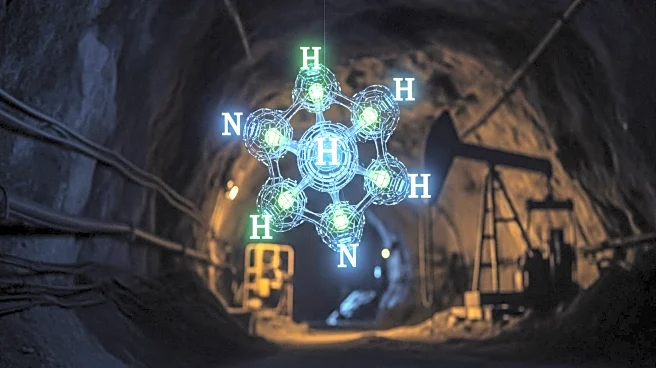What is the story about?
What's Happening?
Scientists have discovered extensive natural hydrogen reserves beneath the Earth's surface, which could provide energy for up to 170,000 years. This finding, published in Nature Reviews, suggests a shift towards extracting naturally occurring hydrogen as a cleaner alternative to fossil fuels. The study identifies two main mechanisms for hydrogen generation: water-rock reactions and radiolysis. Geological settings for hydrogen accumulation are found globally, indicating universal accessibility. Despite challenges, natural hydrogen offers significant economic and environmental benefits as a clean energy source.
Why It's Important?
The discovery of natural hydrogen reserves presents a significant opportunity for reducing global carbon emissions and transitioning to cleaner energy sources. Hydrogen, which burns cleanly and emits only water, could become a cornerstone of future energy systems. The economic benefits are substantial, with production costs estimated to be as low as $0.5 to $1.0 per kilogram, making it competitive with fossil fuels. This could support industries and transport sectors that are difficult to decarbonize with electricity alone, contributing to the global energy transition.
What's Next?
The extraction of natural hydrogen faces challenges, including the need for advancements in exploration and extraction technologies. High-purity hydrogen accumulations are rare and often mixed with other gases, complicating extraction efforts. Additionally, natural hydrogen production is not renewable on human timescales, as reserves are the result of millions of years of geological processes. Overcoming these hurdles is essential to unlocking the full potential of Earth's hydrogen reserves.
Beyond the Headlines
The discovery of natural hydrogen reserves could lead to a significant shift in global energy dynamics, potentially reducing reliance on fossil fuels and decreasing carbon emissions. However, ethical and environmental considerations must be addressed, including the impact of extraction processes on local ecosystems and communities. Long-term shifts in energy policy and infrastructure development will be necessary to fully integrate hydrogen into the energy mix.

















